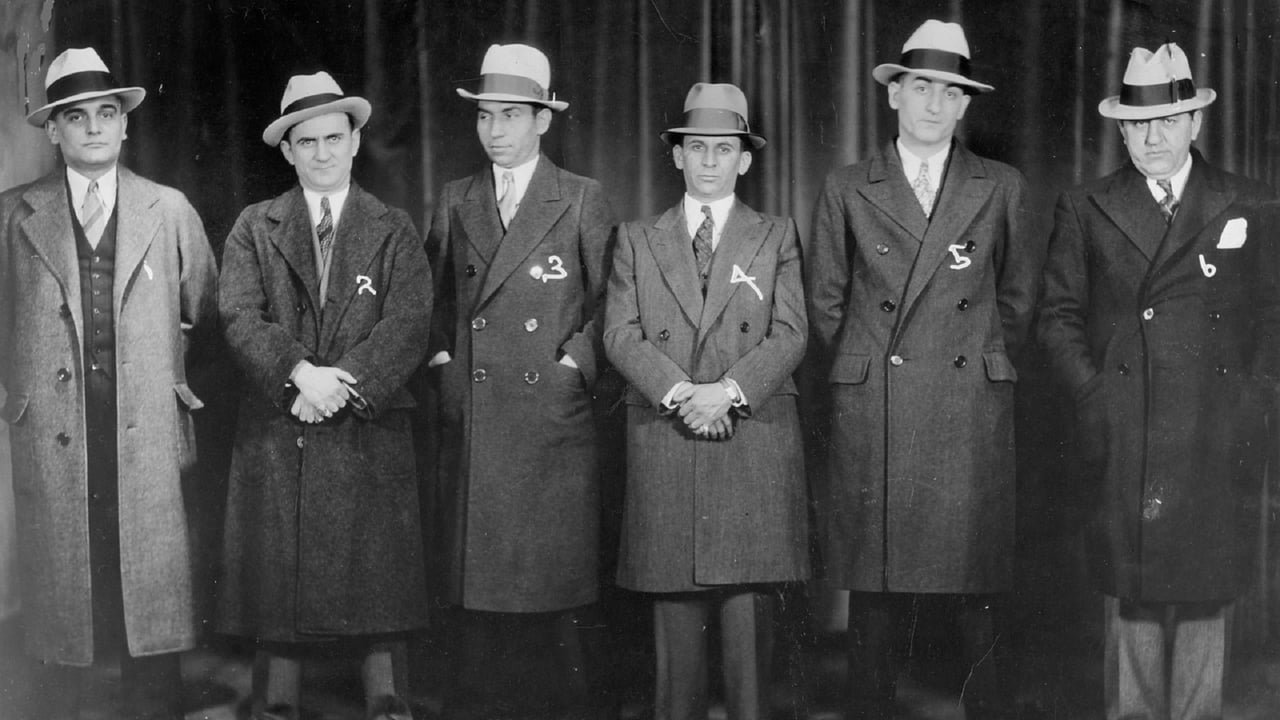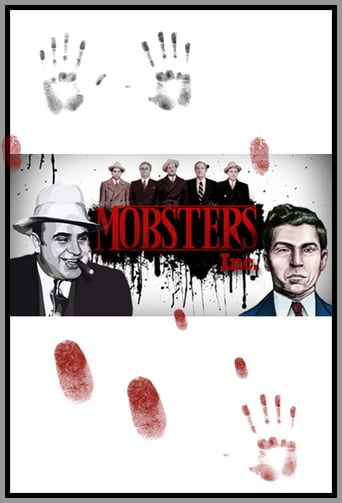Mobsters Season 1

Mobsters is an American documentary television series that profiles the lives of infamous individuals in history; the series puts the spotlight on some of history's most infamous gangsters and all that went on during their reigns. The series airs on The Biography Channel. Some episodes of Mobsters are rehashes of the similar TV Series American Justice as well as Notorious (TV series), both series that were originally broadcast on Biography Channel's sister channel, A&E Network; some episodes also rehash segments from another A&E series American Gangster, which began airing on the Black Entertainment Television channel. The only differences are the intro of the episodes and the lead-in's after commercials. Besides this, the rehashed episodes are no different in any way.
Watch NowWith 30 Day Free Trial!
Mobsters
2007 / TV-PG


Mobsters is an American documentary television series that profiles the lives of infamous individuals in history; the series puts the spotlight on some of history's most infamous gangsters and all that went on during their reigns. The series airs on The Biography Channel. Some episodes of Mobsters are rehashes of the similar TV Series American Justice as well as Notorious (TV series), both series that were originally broadcast on Biography Channel's sister channel, A&E Network; some episodes also rehash segments from another A&E series American Gangster, which began airing on the Black Entertainment Television channel. The only differences are the intro of the episodes and the lead-in's after commercials. Besides this, the rehashed episodes are no different in any way.
Watch Trailer
Mobsters Season 1 Full Episode Guide
Philadelphia mob boss Nicodemo Scarfo, known as "Little Nicky." His paranoia, volatility and treachery ultimately lead to his demise.
Women with mob ties are profiled. Recounts the roles female mobsters Virginia Hill, Arlyne Brickman, and Karen Hill all played in their mafia lifestyles.
Las Vegas mobster Tony Spilotro is profiled. Tony Spilotro made his name in Chicago's most powerful organized crime family and was given control of the gang's casino interests in Las Vegas.
Mickey Cohen became the king of West Coast mob rackets in 1947, following Bugsy Siegel's death.
In this shocking episode of mobsters, we deal with the brutal drug trade which flourished during the 1950s and 1960s, typified by the violent yet hugely interesting figure of the 'Santo Traficante'; literally, the saintly or sacred drug dealer.
Heroin kingpin Frank Lucas dominated the Harlem drug market from 1968 to 1975, before being busted for conspiracy to distribute heroin and serving 5 year of his 70-year sentence.
Carlos Marcello grew up in the mysterious milieu of New Orleans in the early 20th Century to become the city's mafia boss for almost four decades. Despite his modest beginnings, Carlos joined the mafia at age 26 and quickly climbed in the ranks, aided by success in illegal gambling ventures and a talent for making effective payoffs to public officials. In 1947, Marcello became the longtime boss of New Orleans in a reign marked by absolute power, corruption, and antagonism of the U.S. government. At his height he would be revered as possibly the most powerful mob leader in the nation. One day Congress would even suspect Marcello of participating in a conspiracy to kill the President to of the United States.
The fifth child of 13 children, John Joseph Gotti Jr was born on 27th October 1940 in the South Bronx. From a very young age, Gotti made a name for himself in the neighbourhood as the leader of the Fulton-Rockaway Boys, a group of young thugs. Gotti soon became 'capo' of the East New York Crew. After a violent coup he went on to take the leadership position of the Gambino Crime family. All of these events would set Gotti on the path to becoming one of the most well-known figures in Mafia history. Gotti's legendary fashion flair made him an interesting character. His rough cunning made his fellow mafiosi respect him. Gotti's volatile temper made them and others fear him.
Paul Castellano, a New York mob boss who was murdered in 1985. Disliked, and distrusted by members of his own crime family, the Gambino crime family, he still rose to be the head of that crime family, however under controversial and disagreeable circumstances.
Gaetano 'Tommy' Lucchese, a mob figure in 1930s New York, is profiled. He was one of the most successful and notorious members of the Italian-American Mafia. During Tommy's tenure as underboss and boss of what would come to be known as the Lucchese crime family, he pioneered and perfected labor rackets in New York City's kosher chicken industry, the garment district, and the world of professional boxing which generated millions of dollars.
The story of Murder, Inc., a 1930s organized-crime group whose members were mob enforcers. Murder, Inc. was a ruthless gang that carried out an estimate 1,000 mob hits. founded by Meyer Lansky and Benjamin "Bugsy" Siegel, they were assassins that carried out contract killings for the Itailian American, Jewish American mafia, and others
Fugitive James "Whitey" Bulger is profiled. He rose to become a gangster in South Boston, became an informant for the FBI to end the Italian mob in, distract them from his own criminal activities and ended in the largest informant scandal in FBI history.
A profile of Charles "Lucky" Luciano (1897-1962), a mob figure in 1930s New York. Salvatore "Lucky" Luciano creates Murder Inc. and makes millions in racketeering and prostitution.
Mobster Henry Hill's testimony brings down some of New York's most feared criminals. The mobster-turned-informant Henry Hill, who was portrayed by actor Ray Liotta in the 1990 film "Goodfellas."
A profile of New York's Gambino crime family examines the rise of its founder, Carlo Gambino, and that of his successors, Paul Castellano and John Gotti.
Mafia crime boss Joseph Bonanno outlives enemies and publishes his memoirs.
Vincent Gigante attempts to convince the world that he is legally insane.
A profile of Al Capone, who was Chicago's gangland kingpin in the '20s but was cut down by the IRS in 1931 and spent eight years in Alcatraz.
Financial wizard Meyer Lansky survives some 50 years in organized crime.
Joseph Valachi is the first syndicate member to testify against the Cosa Nostra and reveal its inner workings.
A profile of Frank Costello includes an interview with Anthony Quinn. Frank Costello sees himself as a businessman, preferring diplomacy to violence.
The Genovese crime family is the subject.
A profile of Teamsters leader Jimmy Hoffa, who disappeared in 1975. Included: remarks by his daughter Barbara Crancer and biographer Arthur Sloane.
A profile of Benjamin "Bugsy" Siegel (1906-47) chronicles his rise to fame, including his role in building Las Vegas.
A profile of Sammy "the Bull" Gravano, the admitted mob underboss who testified against John Gotti, the head of the Gambino crime family in New York City, in the early 1990s.
Profiling Louis "Lepke" Buchalter (1897-1944), who became a crime boss in the New York City underworld by controlling the garment industry. He was convicted of murder in 1941 and died in the electric chair.
Chicago mob boss Sam Giancana (1908-75) is profiled.
A profile of Jack Ruby (1911-1967), the man who shot and killed Lee Harvey Oswald two days after the 1963 assassination of John F. Kennedy. Included: a discussion of his possible motives for the murder.
Free Trial Channels
Seasons
























